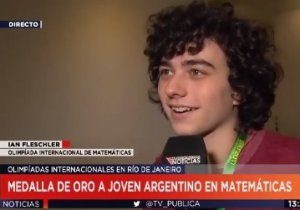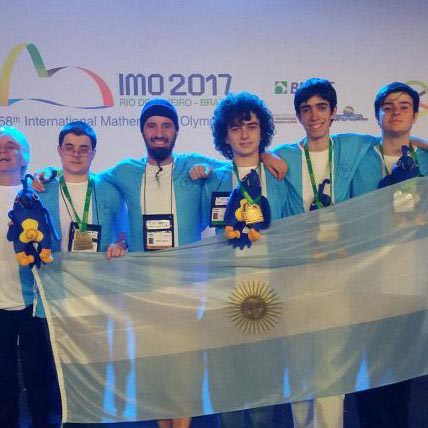ORT Argentina student Ian Fleschler left Buenos Aires for Rio de Janeiro earlier this month an anonymous teenager. He returned 12 days later a national hero, his face beaming out of newspapers and television screens.
“I’ve been recognised twice in the subway,” said Ian cheerfully, albeit bemused by the frenzy of media attention that’s been directed towards his gold medal-winning performance at the world’s top maths competition for high schoolers, the International Mathematical Olympiad.
His medal not only made him the top performing member of the six-strong Argentinean team, it placed him 14th out of the IMO’s 615 contestants and propelled Argentina to 26th out of the 111 countries competing – the best ranking of any Latin American country.

Ian paid tribute to the support he’d received from family, friends and the ORT school.
Ian’s success comes six years after another ORT Argentina student, Ariel Zylber, won a gold at the IMO in Amsterdam; at the time, that was described as a “highly non-trivial achievement” by the first Israeli recipient of the Fields Medal, Professor Elon Lindenstrauss, who only managed a bronze medal when he competed in 1988.
The competition involves two four-hour tests in two days, each of which has three problems to solve. To receive a gold medal the IMO expects participants to score from 24 to 26 points. Ian managed 28.
Modestly, Ian has highlighted in interviews the importance of his family, friends and the ORT high school in his success. “I think if one of those elements had been missing, I would not be where I am now,” he told one journalist.
Later, he added:
“ORT allowed me to find my own path in life. And once I did find my interest, ORT supported me in achieving my goals.”
Now 17, Ian is looking forward to starting Pure Maths at the University of Buenos Aires next year, the same university where his mother, Claudia, is a maths professor. But looking back over his years at ORT, he’s deeply appreciative of what the school has given him.
“I enrolled at ORT because some of my friends went there not because I was really sure it was the best place for me,” he said. “But once I’d started I realised it was a really good choice, the best I could have made; it changed my life entirely.”
What changed his mind was the range of educational and cultural opportunities which ORT placed before him and the efficiency and thoroughness with which it helped him to exploit them. In particular, he credited the school with providing him with Matias Saucedo, the dedicated and knowledgeable tutor who trained him over the past three years for international competition.
“I don’t think I’d be standing here today with a gold medal from the IMO if I’d gone to another school,” Ian said.
But no-one is under any illusions that Ian’s glittering performance is primarily a result of his own talent and the huge number of hours he has put in to prepare for this moment, the realisation of the goal he set himself after winning a gold medal at last year’s Ibero-American Mathematical Olympiad.
Ian hopes to make a career in mathematical research like his personal hero and fellow Argentinean IMO gold medallist Dr Martin Mereb, who is currently engaged at the Institute of Science and Technology in Austria. But in the immediate future he’s looking forward to celebrating with his proud friends and family, at the centre of which promises to be a very special cake.





